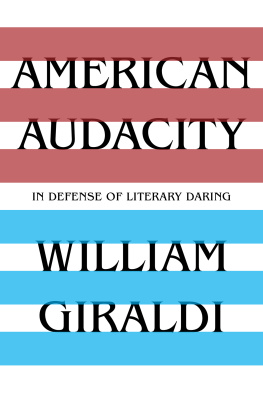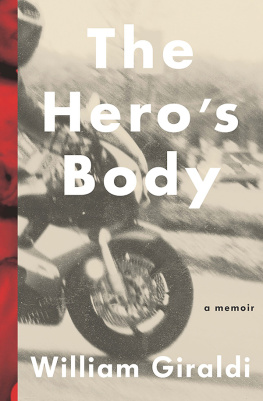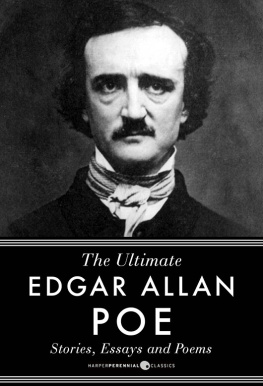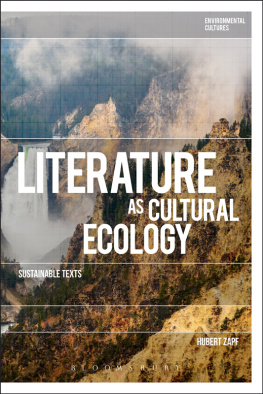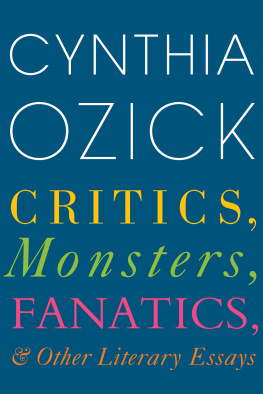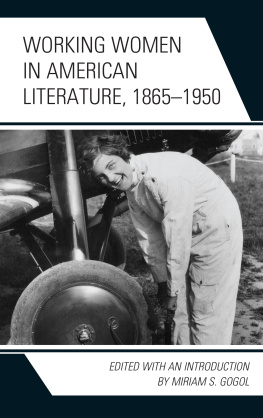
ALSO BY WILLIAM GIRALDI
Busy Monsters: A Novel
Hold the Dark: A Novel
The Heros Body: A Memoir

Copyright 2018 by William Giraldi
All rights reserved
FIRST EDITION
For information about permission to reproduce selections from this book, write to Permissions,
Liveright Publishing Corporation, a division of W. W. Norton & Company, Inc., 500 Fifth Avenue, New York, NY 10110
For information about special discounts for bulk purchases,
please contact W. W. Norton Special Sales
at specialsales@wwnorton.com or 800-233-4830
Book design by Barbara Bachman
Production manager: Beth Steidle
JACKET DESIGN BY STEVE ATTARDO
AND KELSIE NETZER
The Library of Congress has cataloged the printed edition as follows:
Names: Giraldi, William, author.
Title: American audacity : in defense of literary daring / William Giraldi.
Description: First edition. | New York ; London : Liveright Publishing Corporation, 2018. | A collection of essays, some previously published in
The Republic and other publications.
Identifiers: LCCN 2018008751 | ISBN 9781631493904 (hardcover)
Subjects: LCSH: American fictionHistory and criticism. | Authors, American.
| CriticsUnited States. | National characteristics in literature.
Classification: LCC PS3607.I469 A6 2018 | DDC 814/.6dc23 LC record available at https://lccn.loc.gov/2018008751
ISBN 978-1-63149-391-1 (eBook)
Liveright Publishing Corporation, 500 Fifth Avenue, New York, N.Y. 10110
www.wwnorton.com
W. W. Norton & Company Ltd., 15 Carlisle Street, London W1D 3BS
To ED MINUS,
who gave me literature,
and to BOB WEIL,
who knows why it matters.
CONTENTS

CYNTHIA OZICK
STANLEY FISH
KATIE ROIPHE
DAVID DENBY
LIONEL TRILLING
WENDY LESSER
HAROLD BLOOM
JAMES WOLCOTT
JOSEPH EPSTEIN
NORMAN PODHORETZ
ALLAN GURGANUS
HARPER LEE
MOBY-DICK
EDGAR ALLAN POE
CARL VAN VECHTEN
DANIEL WOODRELL
CHRISTIAN WIMAN
ELIZABETH SPENCER
PADGETT POWELL
BARRY HANNAH
LAUREN SLATER
DENIS JOHNSON
CORMAC MCCARTHY
CHILD OF GOD
FRANCINE PROSE
RICHARD FORD

I N THE SEVEN YEARS I SPENT PRODUCING THIS BOOK, I was never pestered by the awareness of being an American writer with strictly American themes to pursuebeware of those who are pushy on the point of their own nationalityand yet when it came time to confront my critical work, to cull and then shape some of it into a coherent mass, I had no other choice but to see how American Ive been all along: in my sensibility, my concerns, my conception of literature and self. Perhaps we American writers are helpless not to pulse with our own Americannessthe national ethos is too much with us, our brief history too manifest, our media-borne manias too destructive and distractingbut my critical work didnt necessarily begin that way. My critical work began with two Brits.
In graduate school at Boston University in the early aughts, I enrolled in a seminar with the eminent English poet-critic Geoffrey Hill, a semester-long agon with the verse and theology of Father Gerard Manley Hopkins. I was the only fiction writer in a room full of poets with academic aspirations, poets who regarded me, I feared, as something of an unwelcome oddity. One told me that she didnt quite understand what a fiction writer wanted from Hopkins and Hill. If youre thinking how resoundingly obvious it is that a fiction writer can benefit from the intense study of a poet, Ive found that some among us eschew the resoundingly obvious. Perhaps the bafflement emerges from the fact that the inverse wont exactly hold: poets have less to learn from novelists, since their principal aim is the architecture of the auditory and not the agency of character and narrative.
Anyway, Hill took me aside one afternoon to let me know that I didnt have what it took to be a tweed, didnt have the conformist mettle and turbid prose of the average academic, but that I might have some luck as a reviewer or literary essayist for the common reader, as Dr. Johnson meant it. Hill sent me home that day with a pile of essays by the American poet-critics he most reveredT. S. Eliot, R. P. Blackmur, Yvor Winters, Allen Tate, John Crowe Ransomthough much of what Id learn about literary comment would come directly from Hill himself, from taking in his mode of evaluating Hopkinss verse, his fertile insights into how the words function in their stanzas and lines, singly and in pairs, and how Hopkinss religio-poetical vision breathes, expands in his rhythms. It remains the most transformative classroom encounter of my life.
Hills was an effortlessly severe intensity, vigorous apprehending by a mammoth intellect, a man regarded by many, including Donald Hall and Harold Bloom, as the greatest English poet of his generation. His rhapsodical denunciations of inferior writing could send giddy fear rip pling through the room. He once read aloud a new poem by a much-decorated American poet that had just appeared in a much-decorated American magazine, and at the end of it declared, in that frightfully beautiful Worcestershire brogue: There are perhaps two words and a comma which I wouldnt be utterly ashamed to have written. And then he went through the poem, syllable by syllable, period by period, and explained why and how each was the wrong choice. But to hear him give praise to Hopkins and the other literary giants who mattered to himTo have written that , my God was an unforgettable tutorial in the efficacy of literary love.
Much of my criticism, though I write mostly on prose, has been an effort to enact the standards I learned from Hill, a struggle to become somewhat worthy of his tremendous example, and also a remembrance of the kindness he showed to me. After the seminar, he tolerated my youths pesky gusto for another semester, during weekly sessions at his officehe always wore a black sweat suit painted in white cat hairwhere he guided me through the roiling labyrinth of Hopkinss great long poem The Wreck of the Deutschland. When Hill died too soon in 2016, the world became a much darker, duller place for me. I still hear his voice daily.
Most fiction writers at the entrance gate of their careers quickly see that no one is all that eager to pay them for their stories, but I saw that I could cover a few monthly bills with a twelve-hundred-word review. With Hills help, I sold my first essay-review that same semester, on the Russian writer Tatyana Tolstaya, to the fabled Partisan Review , which then promptly shut down operation before my piece could be published. But a paycheck showed up in the mail anyway, indeed enough to cover a bill, and since then Ive gone on having bills. Criticism doesnt pay very much but it does pay something, and those of us with greedy little mouths at home will take what we can get. Still, the critic best have some other motive, some other need thats fulfilled by entering the arena of literary comment. For some, that need assumes dignity by morphing into duty.
The critic is a reader before he is a writer, a spirited lover of literature, and criticism is one important use to which he puts his reading and his love. To sit before literature in appreciation and awe, to want to have some hand in facilitating literatures efficacy, to comprehend that literature is, in Kenneth Burkes phrase, equipment for living, a means of enlargement and enhancement and understanding: these are the critics prerequisites. The critic should be tethered to no theory, no ideology, no asphyxiating ism. Like the poet and novelist, he should be of no party. Ideology is the enemy of art because ideology is the end of imagination. The critics chief loyalty is to the duet of beauty and wisdom, to the well made and usefully wise, and to the ligatures between style and meaning.
Next page
